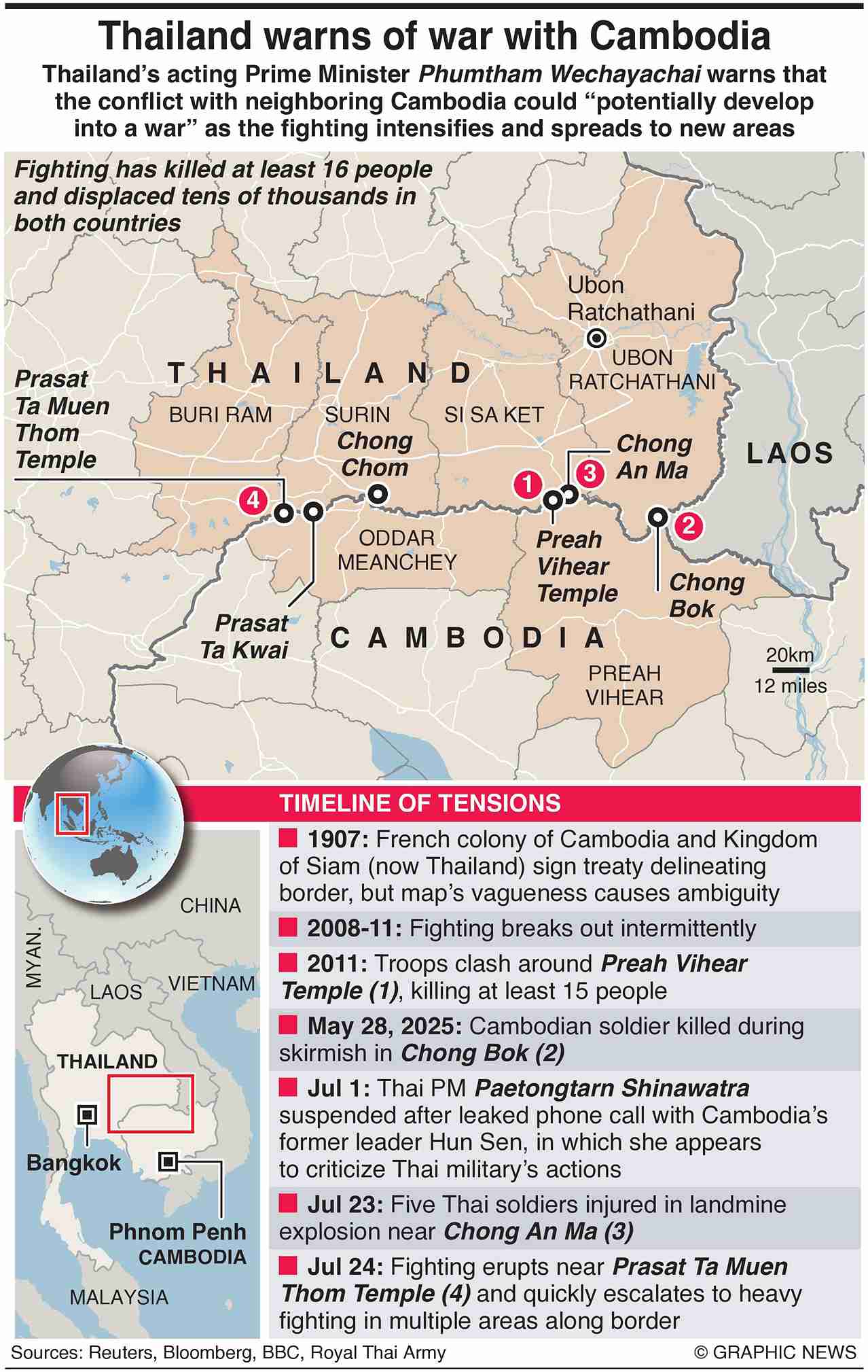Thailand and Cambodia exchanged heavy artillery fire for a second day yesterday as border fighting intensified and spread, while Cambodia’s leader said Thailand had agreed to a Malaysian ceasefire proposal but then backed down.
At least 20 people have been killed and more than 130,000 people displaced in the worst fighting between the Southeast Asian neighbours in 13 years. Both sides have blamed each other for starting the conflict and yesterday ratcheted up the rhetoric. Thailand accused Cambodia of deliberately attacking civilians and Cambodia condemned Thailand for using cluster munitions, controversial and widely condemned.
Thailand’s acting prime minister, Phumtham Wechayachai, said Cambodia had attacked on multiple fronts.
“The situation has intensified and could escalate into a state of war. At present, it’s a confrontation involving heavy weapons,” he told reporters.
Cambodian Prime Minister Hun Manet said in a social media post that he had agreed to a ceasefire proposed by his Malaysian counterpart Anwar Ibrahim, chair of the Asean regional bloc, who had informed him that Phumtham had also agreed.
“However, it is regrettable that just over an hour later, the Thai side informed that they had reversed their position,” Hun Manet said.
Thailand later yesterday said it agreed in principle with the idea of a ceasefire and would consider it, but that it must be based on ‘appropriate on-the-ground conditions’.
“Throughout the day, Cambodian forces have continued their indiscriminate attacks,” the Thai foreign ministry said in a post on X. “Cambodia’s actions demonstrate a lack of good faith and continue to place civilians in danger.”
Two senior Thai foreign ministry officials earlier said Bangkok had received offers of mediation from the US, Malaysia and China, but preferred to use bilateral mechanisms.
Fighting re-erupted before dawn yesterday, with clashes reported in 12 locations, up from six on Thursday, according to Thailand’s military. It accused Cambodia of using artillery and Russian-made BM-21 rockets to attack areas that included schools and hospitals.
“These barbaric acts have senselessly claimed lives and inflicted injuries upon numerous innocent civilians,” it said.
“The deliberate targeting of civilians is a war crime and those responsible must be brought to justice.”
It put the blame squarely on the Phnom Penh government, which it said was being steered by Hun Sen, influential former premier of nearly four decades and father of Hun Manet.
Reuters journalists in Thailand’s Surin province saw a Thai military convoy of about a dozen trucks, armoured vehicles and tanks cut across provincial roads ringed by paddy fields as it moved toward the border. Intermittent bursts of explosions could be heard.
Reports said Thailand’s bombardments had caused ‘significant and visible damage’ to the 11th-century Preah Vihear temple, a Unesco World Heritage Site that both countries have laid claim to for decades.
Thailand’s military called the allegation ‘a clear distortion of facts’. The trigger for the conflict was Thailand recalling its ambassador to Phnom Penh and expelling Cambodia’s envoy on Wednesday, in response to a second Thai soldier losing a limb to a landmine that Bangkok alleged had been laid recently by rival troops. Cambodia denied that.



&uuid=(email))